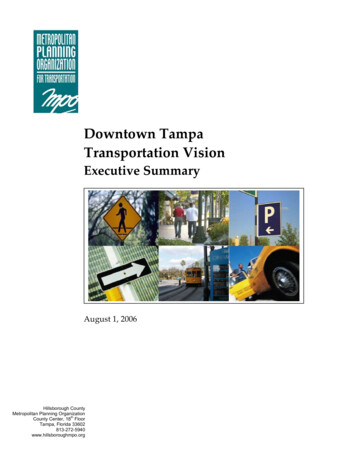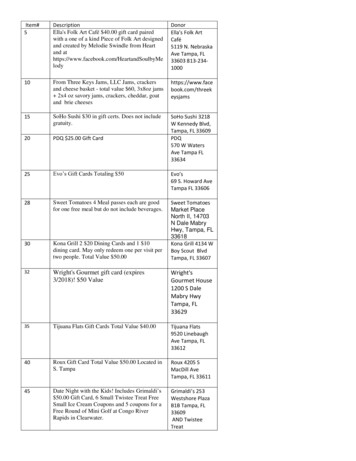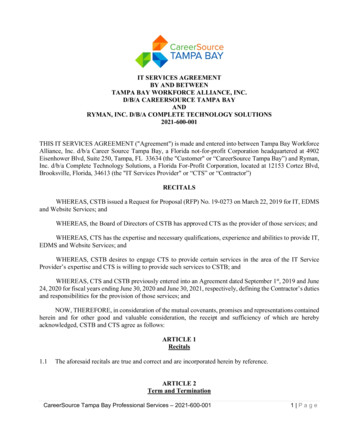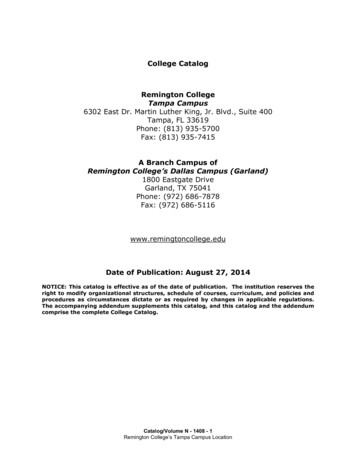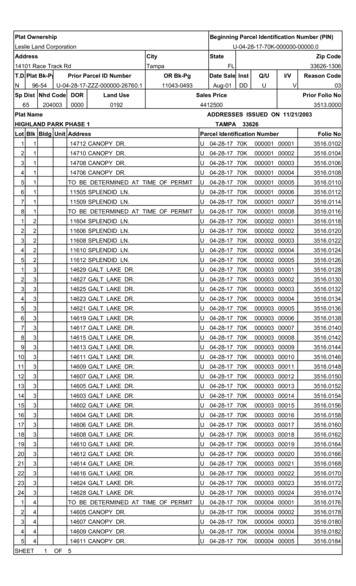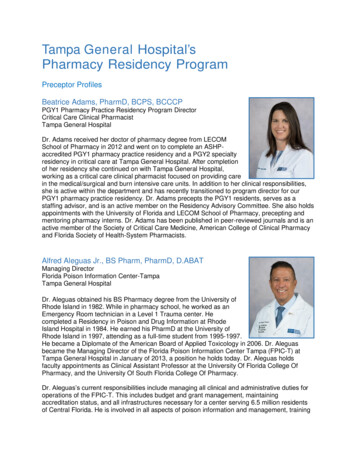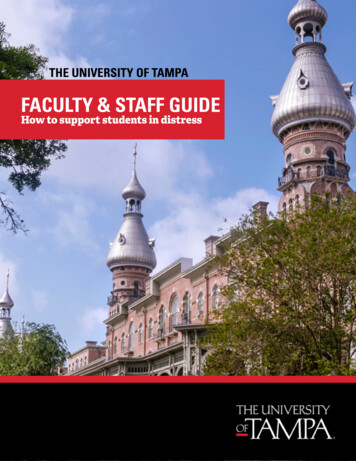
Transcription
THE UNIVERSITY OF TAMPAFACULTY & STAFF GUIDEHow to support students in distressTHE UNIVERSITY OF TAMPA
CONTENTSEmotional Calendar.3Information regarding mental health concerns. 4-5Information regarding disclosed trauma .6Information regarding suicidal thoughts .7Campus Resources.8Off-Campus Resources .9THE UNIVERSITY OF TAMPA
EMOTIONAL CALENDARThis is a list of what students may experience at various times of the school year. This is not exhaustive,and you always want to listen to your students and watch for anything of concern. Feel free to introducesome of these topics briefy, normalize the emotions students may feel and mention available resources.September Homesickness Frequent calls and visits home Roommate conficts Testing newfound freedom Drop/Add issues Diffculty making friends/ftting in Adjustment issues Increase in alcohol useOctober Increased academic demands Increased stress levels Doubts about college life Questioning path or major Dating issues, friend issues Financial strainNovember/December Cold/fu sicknesses Learning time management Increased anxiety Holiday stress, such as family concerns Concerned about seeing family orfriends over break Challenges to control substance useJanuary/February Homesickness coming back from break Home relationships changing Diffculty with motivation Pressure of academic performance Adjustment issues for new spring students Re-establishment of school routines Valentine’s Day bringing out lonelinessMarch Academic issues and stress may leadto depression, anxiety, substance use Worries about future plans and direction Tension around spring break plans Fatigue or boredom with school routineApril/May Academic stress and/or burnout Concerns about summer plans/jobs Worries about semester ending Returning home for summer challengessuch as lack of independence and lossof school social support systemTHE UNIVERSITY OF TAMPA
MENTAL HEALTH CONCERNSFor faculty working with students who exhibit mental health concernsIf you have a feeling that something is “off” or out of the ordinary behavioral range of a student, you areusually correct. You can help that student by referring them to the Spartan Support Program.This program is not punitive but designed to be proactive to offer support and assistance to students.Some observed behaviors that indicate distress may include:Academic Signs Reduction in quality/quantity of workRepeated absencesBizarre, oddly-worded or threatening email messages or assignmentsContinual requests for extensions or course adjustments with no documentationPhysical Signs Impairment due to suspected substance use or abuseDramatic change in energy levelFalling asleep in classNoticeable physical injuries (bruises, cutting marks on arms or legs, burns)Changes in hygiene habitsEmotional Signs Direct statements about current issues (family, relationships, mental health, fnances, roommates)Direct statements about a recent traumaChanges in behavioral patterns or habitsInappropriate emotional responses in any direction (exaggerated anger, sadness or fat affects)Resistance to change or boundariesDisplays of paranoia or distrustOnline postings that indicate distress, violent ideations or expressions of self-harmPreoccupation with violent events, violence and/or weaponsStrained interpersonal relationships, isolating behaviors or decreasing self-imageTHE UNIVERSITY OF TAMPA
WHAT TO DO Let the student know you have noticed changes and you want to check-inListen actively and empatheticallyThank them for sharingOffer appropriate resources and referrals: Spartan Support Program or Counseling CenterNormalize going to a counselor and remind them it is confdentialDon’t feel like you have to fx things or solve everythingProvide a listening ear, then ask what next steps might be helpful such as resources and future check-insRemember that having someone who cares goes a long way.Your listening can be the frst step to helping the student feelsupported and being willing to seek additional assistance and resources.THE UNIVERSITY OF TAMPA
TRAUMATIC CONCERNSFor faculty working with students who have disclosed traumaWhat is trauma?A traumatic event can be any incident that causes physical, emotional, spiritual or psychological harm.What are normal reactions to trauma?People respond in many different ways. There may be an initial period of shock and it may take some timefor the weight of the event to be fully experienced.Often people experience: NightmaresDiffculty falling or staying asleepDiffculty focusing and/or diffculty staying on taskAvoidance of triggers related to the eventMood and/or appetite changesFlashbacks of the eventAngerPhysical symptoms such as headaches, nausea, stomachaches and fatigueWorsening of existing medical conditionsWHAT TO DOAlways listen actively and empathetically. Thank them for sharing and being willing to open up.You may be the frst person they have shared their experience with and it can be very diffcult to gather courageto have these conversations. If appropriate, encourage and reassure them for having that courage.Normalize their responses. Many people who have been traumatized feel like there is something wrongwith them when their body is simply responding to that trauma. Assure them of the natural response,reassure them for getting to this point and let them know they are not alone.Offer appropriate resources and referrals: Spartan Support ProgramCounseling Center- confdential resourceVictim Advocacy Program- confdential resource that provides information and resourcesTitle IXCrisis Center of Tampa BayTHE UNIVERSITY OF TAMPA
SUICIDAL CONCERNSFor faculty working with students who are having thoughts of suicideIf a student expresses thoughts of suicide or indicates that they have a plan for suicide, stay with themand connect them to resources immediately. 8:30 a.m. to 5 p.m. Monday through Friday: call the Counseling Center at (813) 253-6250After hours, call Campus Safety at (813) 257-7777THE UNIVERSITY OF TAMPA
CAMPUS RESOURCESVictim Advocacy (813) 257-3900 ut.edu/victimadvocacyProvides a number of services for students who have been the victim of a violent crime.Spartan Support Program (813) 257-3901 ut.edu/spartansupportProvides support to students and connection to resources to address the student’s unique needs.Dickey Health and Wellness Center (813) 253-6250 and-wellness-centerProvides confdential medical services and mental health counseling.Campus Safety (813) 257-7777 rovides a safe and secure environment for the campus.LASER Team (813) 257-4515 serviceProvides transport assistance whether due to injury, disability, adverse weather (not including severestorms with lightning) or for general safety.International Programs Offce (813) 258-7433 t-and-scholar-servicesProvides support for documentation, regulations, cultural adjustments, academic issues and other concerns forinternational students.Residence Life (813) 253-6239 ut.edu/campus-life/residence-lifeProvides inclusive residential community and dynamic learning experiences that promote student developmentand academic success.Bias Education Resource Team ations-and-planning/bias-education- resource-team-(bert)Provides support and resources to those individuals who have been targeted or impacted by an act of bias.Title IX s/title-ixProvides grievance procedures and supportive measure options in compliance with federal law prohibitingdiscrimination based on sex.THE UNIVERSITY OF TAMPA
OFF-CAMPUS RESOURCESCrisis Center of Tampa Bay 211 or (813) 264-9961 crisiscenter.comProvides support for sexual assault survivors, domestic violence survivors, general trauma or distressProvides forensic exams up to 5 days after a sexual assault.The Spring of Tampa Bay (813) 247-7233 thespring.orgProvides support for domestic violence survivors.RAINN National Hotline (800) 656-4673 rainn.orgProvides information about sexual assault and sexual abuse.Bay Area Legal Services (800) 625-2257 bals.orgProvides civil legal services to low income Tampa Bay residents.Florida Council Against Sexual Violence (850) 297-2000 fcasv.orgProvides resources and legal services to survivors of sexual assault in the state of Florida.Florida Department of Children and Families Abuse Hotline (800) 962-2873 myffamilies.comProvides resources to Florida families.Florida statute 39.201 (1)(a)Any person who knows, or has reasonable cause to suspect that someone under 18 years old isabused, abandoned, neglected by a parent, legal custodian, caregiver, or other person responsiblefor the child’s welfare is a mandated reporter.THE UNIVERSITY OF TAMPA
THE UNIVERSITY OF TAMPA. OFF-CAMPUS RESOURCES Crisis Center of Tampa Bay 211 or (813) 264-9961 crisiscenter.com Provides support for sexual assault survivors, domestic violence survivors, general trauma or distress Provides forensic exams up to 5 days after a sexual assault. The Spring of Tampa Bay (813) 247-7233 thespring.org


